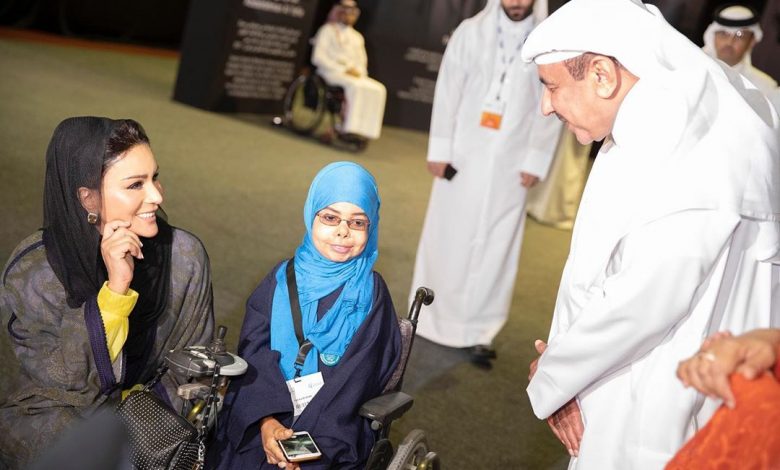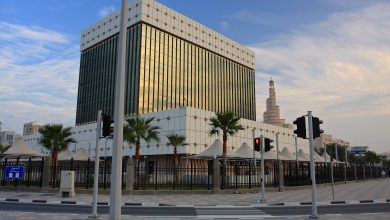
Sheikha Moza inaugurates Doha International Conference on Disability and Development
صاحبة السمو تفتتح مؤتمر الدوحة الدولي للإعاقة والتنمية
H H Sheikha Moza bint Nasser, a global advocate for the UN’s Sustainable Development Goals (SDGs), and Founder of Qatar Foundation for Social Work (QFSW), inaugurated Doha International Conference on Disability and Development (DICDD) during a grand ceremony held at Qatar National Convention Center (QNCC) yesterday.
The conference, which is being held under the theme ‘Leaving No-One Behind’, has been organised by QFSW in collaboration with local and international partners and will conclude tomorrow.
H H Sheikha Moza bint Nasser officially inaugurated the accompanying exhibition, which showcased local initiatives, projects, and assistive-technologies that are today empowering people with disabilities
The Deputy Secretary-General of the United Nations, Amina J Mohammed, and the Advisor to the Presidential Government of the Republic of Ecuador, Xavier Torres, also attended the opening ceremony.
On the opening day, more than 1,500 experts, specialists and policy-makers from Qatar and around the world took part in the conference.
Addressing the opening ceremony, H H Sheikha Moza bint Nasser said: “First, allow me to wonder: what is disability? What is the difference between a person who has a disability and one who does not. Who describes and defines this concept.”
She said: “Recent studies have shown what I also believe: that every human has some form of disability, albeit of different kinds and at different stages. But there should be no difference between one person and another, based on their level of disability. Indeed, I believe that disability is a stereotype perpetuated by a prevailing mentality and social culture that define persons with disabilities based on misconceptions. There are two perspectives on disability: one comes from a medical standpoint, and one from a social standpoint. The typical treatment of people with disabilities follows the medical approach, which focuses on physical and visible attributes.”
H H Sheikha Moza bint Nasser said that the very concept of disability is limited to traditional disabilities and excludes other disabilities, and so when we rallied for the cause of disability in the past, we overlooked many people who are exposed to harsh conditions and, thus, suffer psychological damage, whether because of factors related to family, society, or the effects of war and conflict.
“If our concept of disability is based on visible disability, and ignores hidden disability, then doesn’t the illiterate suffer from an educational disability? Is ignorance not an intellectual disability? Isn’t there also such a concept as political disability? And isn’t the violation and assault against others a moral disability? I also believe distinguishing people apart based on the definition of disability implicates a form of discrimination.”
Sometimes, I even feel that the exceptions we make for people with disabilities, with the intention of showing sympathy toward them, do more harm than good.”
H H Sheikha Moza bint Nasser said: “During my preparation to participate in Disability Week, I wanted to be able to identify with those involved in this event. I read The Days by Taha Hussein, known as the blind dean of Arabic literature. He mentioned how, according to his personal experience, a child with disability is trapped between the sympathy of their family and the negativity — even mockery — that they experience outside the home. These two behaviours bring about another disability to a child because they prevent them from naturally growing and organically integrating into society. Unfortunately, and evidently, a major change has not occurred in dealing with the issue of disability. Children with disabilities still suffer from what Taha Hussein was talking about seven decades ago, as if time has stopped.
“In order to restore time’s passage and address the discrimination resulting from the current and past concept of disability, we have a great deal of work ahead of us to correct the consequences of these misconceptions and the perceptions that followed as a result.
“To understand just how much work is required, there are 1.5 billion people with disabilities around the world, more than the total population of North America, Europe, Australia, and Japan combined. And these numbers make us realise the unacceptable level of negligence that has been shown toward these people, who we chose to describe as disabled and chose to be distinguished apart from them. When we look at the developing countries, they contain more than 80 percent of the total number of people with disabilities in the world. This makes it blatantly clear: that disability levels are an indicator of a nation’s development, wherein development and stability declines, the percentage of people with disabilities increases.”
H H Sheikha Moza bint Nasser said: “In the Arab world, it is estimated that there are 40 million people with disabilities, more than half of them are children and teenagers, due to effects of wars and conflicts, as we have seen in Iraq since 1980 and Syria, Libya, and Yemen since 2011.
“Despite Qatar’s leadership in being one of the most supportive countries for people with disabilities, we are looking to see more support in promoting education and employment opportunities. We are now more optimistic after what we have seen the country’s decision-makers pledge, and, from our side, we share this commitment.
“We must collaborate globally to devise mechanisms to stop the waste in resources caused by the lack of investment and empowerment for people with disabilities and enable them to play active roles in the development of society. We can achieve this through meaningful employment of this large number that has been marginalised for the sake of disability, especially those talented among them.
“I was astounded by Taha Hussein’s remarkable ability to describe his surroundings in detail, as if he had more than two eyes. It made me realise that disability is not in lack of sight, but in lack of insight. In his own words, may he rest in peace: “We have not been created without any purpose. We have not been tasked with simply satisfying people. We have been given a duty, and it is a duty we must perform. If we do not fulfil this duty, we must accept the responsibilities and the consequences. The time has come for everyone to perform their duty. The time has come to put an end to this kind of blind discrimination. Rest assured, nothing about you will be done without you.”
H E Amina J. Mohammed said: “I would like to highlight the tireless efforts of H H Sheikha Moza bint Nasser herself. She is one of the most dedicated advocates we have for improving education around the globe and ensuring no one is left behind, especially persons with disabilities.”
Sanaullah Ataullah | The Peninsula
الدوحة -قنا
شهدت صاحبة السمو الشيخة موزا بنت ناصر، مؤسس المؤسسة القطرية للعمل الاجتماعي، صباح اليوم افتتاح مؤتمر الدوحة الدولي للإعاقة والتنمية الذي يقام تحت عنوان “حتى لا يترك أحد خلف الركب” بمركز قطر الوطني للمؤتمرات.
ودعت صاحبة السمو في كلمتها إلى إعادة تعريف الإعاقة ومعالجة التمييز بين شخص وآخر على أساس الإعاقة بمفهومها المغلوط، قائلة: “أرى أن الإعاقة فكرة نمطية تديمها العقلية السائدة والثقافة الاجتماعية اللتين تحددان تعريف ذوي الإعاقة وتؤطران نموذجهما بالتصورات الخاطئة. فهناك منظوران للإعاقة: منظور طبي ومنظور اجتماعي. والتعامل النمطي يكرس المنظور الطبي الذي يركز على القدرات الحركية أو الظاهرة.”
وأكدت بأن المفاهيم تتأسس على الإعاقة الظاهرة وتتجاهل الإعاقة الخفية، متسائلة: “ألا يعاني الأمي من إعاقة تعليمية؟ أليس الجهل إعاقة معرفية؟ أليست هناك إعاقة سياسية؟ أليس الاعتداء على الغير إعاقة أخلاقية؟”.
وأضافت: “أعتقد أن تمييز بعض الأشخاص بتوصيف مشتق من مفردة الإعاقة نفسها، هو توصيف متورط بشكل من أشكال التمييز العنصري، بل إنني أشعر في بعض الأحيان أن الاستثناء الذي يحصل عليه الأشخاص ذوو الإعاقة استثناء يضر بهم أكثر مما ينفعهم، كما هي الحال بالنسبة إلى الامتياز النابع من الشفقة”.
وفي ختام كلمتها، شددت سموها على ضرورة الاستثمار في الأشخاص ذوي الإعاقة لتمكينهم من أداء دورهم التنموي في المجتمع، قائلة: “ويتعين علينا، في العالم أجمع، التعاون لابتكار آليات قادرة على وقف الهدر الناجم عن غياب الاستثمار في ذوي الإعاقة وعدم تمكينهم من أداء دورهم التنموي، وذلك من خلال التوظيف المهني لهذه الأعداد الكبيرة من المهمشين بدعوى الإعاقة، لا سيما وأن بينهم موهوبين جديرين برعاية مواهبهم”.
حضر الافتتاح سعادة السيدة أمينة محمد، نائب الأمين العام للأمم المتحدة، وعدد من أصحاب السعادة الشيوخ والوزراء والمختصين في هذا المجال.
كما قامت سموها بعد ذلك بجولة في المعرض المصاحب لفعاليات المؤتمر، وهو بعنوان “إنجازات رغم التحديات”. ويلقي المعرض الضوء على إنجازات الأشخاص ذوي الإعاقة بالاضافة إلى عرض عدد من المبادرات المحلية والمشروعات والتقنيات المساعدة في هذا المجال.



